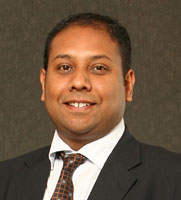Africa told to get moving on power generation

This was the chief finding of a panel discussion on "Powering Africa's Growth: The opportunities and challenges". The panel reviewed the generation mix change and the respective roles of gas, coal, hydro, nuclear and renewable sources for the future, but particularly South Africa's leadership role on the continent and within the SADC power pool in driving initiatives. With him on the panel were Dipuo Peters, South African Energy Minister; Maria Idalina Valente, Angolan Trade Minister; Dan Marokene, Eskom Group Executive: Technology and Commercial and Carlos Pone, CEO at Power Firm ABB South Africa.
Deloitte was selected as the knowledge partners to the DTI for the conference, and Sivasanker, Deloitte Power and Infrastructure Leader, moderated this discussion session.
The panel outlined the problem in the following terms: sub-Saharan Africa has a population of almost one billion people, but this 17% of the world's population produced only 4% of the world's power supply, of which three-quarters came from South Africa, Egypt and other North African countries. This left barely 1% for the bulk of the continent. In the case of Nigeria, its transmission capacity is the same as Hungary's, but for 16 times the population.
Sivasanker said, "The African continent is rich in the raw ingredients for power generation, be it coal (South Africa and Mozambique), gas (Mozambique) or renewable energy in the form of hydro (in DRC, Angola or Uganda), solar or geothermal heat across the Great Rift Valley in East Africa."
Infrastructure needed
"These are resources which have the potential to sharply accelerate the development of many African countries, but each country tends to start with a lack of infrastructure to access these resources. There are other challenges facing this industry apart from lack of infrastructure like the skills shortage and finance."
There is need for a facilitating policy framework to attract inward investment, in countries which are unfamiliar with such policy setting, and it requires a more active participation by the private sector, which in turn requires keeping power prices sufficiently low to attract foreign investment.
The panel found that notwithstanding these challenges, there was a growing awakening across the continent to the opportunity presenting itself, and a realisation that they urgently need to be driving the planning of power generation within each country. Such planning initiatives would require an enabling policy environment for funding, skills development and private sector participation.
The time is now
Sivasanker said, "However, we have reached the cusp of change, a point where we have moved beyond talk and the need is quite firmly for action."
There are three key enablers for the private sector playing a role in power generation. Enabling government policy has to be in place. It requires a viable cost-recovery mechanism. Funding is a key issue as power stations are a long-term investment requiring a 25-year agreement over the life of a Power Purchase Agreement (PPA). Thirdly, the buyer in any such agreement is the government, so it requires a government support package to stand behind the power generator. The question here is the extent to which government will guarantee private sector lenders in order to level the playing field.
There are opportunities in Africa for investment in power generation, with Kenya for one having developed the policy framework. He said there needed to be a move to accelerate the establishment of the regulatory and financial prerequisites, before investment would flow into power in Africa.
"What we do here in South Africa will act as a blueprint for other countries in Africa. We're very optimistic about investment programs into Africa," he said.
The significance of the power sector was substantial: not only would it fuel economic development, but it was in itself a big sector with the capability of generating jobs. "For instance, the local procurement aspect of Eskom's programme is currently 60%, and that generates a lot of jobs. This is the type of policy framework Africa needs to be implementing, with a similar localisation component. This enables Africa to move across the value chain, creating not only jobs but skills, driving economic development and feeding those benefits back to society.
"Those of us in the sector are fully aware of the opportunity: rural electrification across Africa is only at a penetration level of 25% at the moment, and 58% of all people have no access to power in Africa. What is urgently needed is decisions around policy development, technology and creating the necessary skills and private sector participation," said Sivasanker.








